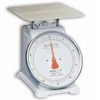
Household moves which cross state borders within the United States are called "interstate moves" and interstate moving charges are based on the weight of your shipment of household goods and personal effects.
Moving companies must observe specific lawful steps to obtain the weight of your shipment; these rules are outlined in the Federal Department of Transportation's booklet titled "Your Rights and Responsibilities When You Move."
Here is a brief summary of the process used to obtain the weight of your shipment...
- Your moving truck is weighed prior to loading your shipment on the moving truck at origin.
- This process is called the obtaining the "Tare Weight" or the "Light Weight" and you have the right to view this weighing if you want to do so.
- Your shipment is then loaded on the moving truck.
- Your moving truck is weighed a second time, after your shipment has been loaded.
- This process is called the "Gross Weight" or the "Heavy Weight" and you have the right to view this weighing too.
- The Gross weight, less the Tare weight determines the Net weight of your shipment.
- Your moving charges are based upon the Net weight of your shipment.
- Nothing can be added to the truck between weights, and this includes -- but is not limited to -- fuel, equipment, men, other shipments or material.
- In addition, if you have any doubts about the accuracy of the weights which were obtained at origin you may request that the truck be weighed again at destination. This is called "back-weighing" the shipment. This is also called a "Reweigh."
- When the truck is reweighed at destination the mover weighs the truck prior to unloading and after unloading to determine the Net shipment weight.
As we stated in the beginning of this article, the rules and procedures which govern the weighing procedure are outlines in the Federal Department of Transportation's booklet titled "Your Rights and Responsibilities When You Move" which we have quoted below...
Weighing Shipments
If your mover transports your household goods on a non-binding estimate, your mover must determine the actual weight of your shipment on a certified scale in order to calculate its lawful tariff charge. If your mover provided a binding estimate, the weight of the shipment will not affect the charges you will pay, so there is no requirement to weigh shipments moving under binding estimates.
Most movers have a minimum weight charge for transporting a shipment. If your shipment appears to weigh less than the mover’s minimum weight, your mover must state the minimum cost on the order for service. Should your mover fail to advise you of the minimum charges and your shipment is less than the minimum weight, your mover must base your final charges upon the actual weight, not upon the minimum weight.
Usually, your shipment will be weighed in the city or local area where the shipment originates. The driver has the truck weighed before coming to your residence and then has it weighed again after your shipment has been loaded. The difference in these two weights is the weight of your shipment.
The mover may also weigh your shipment at destination when the shipment is delivered. The driver will have the truck weighed with your shipment on board and then weighed a second time after your shipment has been unloaded. Each time a weighing is performed, the driver is required to obtain an official weight ticket signed by the weigh master of a certified scale and a copy of the weight tickets must accompany your copy of the bill of lading. Shipments of less than 3,000 pounds may be weighed on a certified warehouse scale.
You have the right, and your mover must inform you of your right, to observe all weighing of your shipment. Your mover must tell you where and when each weighing will occur. Your mover must give you a reasonable opportunity to be present to observe the weighing. You may waive your right to observe weighing; however, you must waive that right in writing.
If your shipment is weighed at origin and you believe that the weight may not be accurate, you have the right to request that the shipment be reweighed before it is unloaded. The mover is not permitted to charge you for the reweighing, but the final charges due will be based on the reweigh weight, even if it is more than the initial weight.
* * *

Add new comment